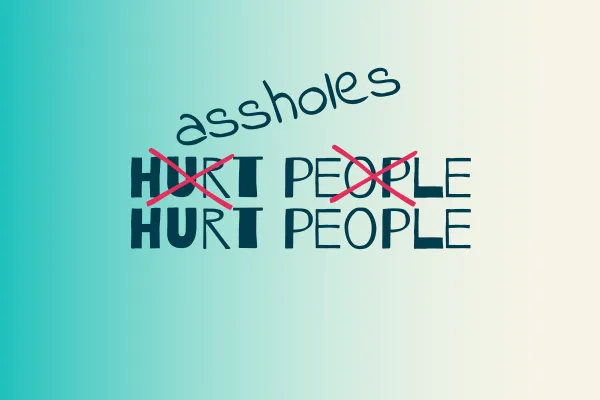
Rethinking "Hurt People, Hurt People"
Rethinking "Hurt People, Hurt People": Why It’s Time to Break Free from Misplaced Sympathy
We've all heard it over and over: “Hurt people, hurt people.” It’s a well-intentioned phrase, often meant to help us understand the roots of pain and foster compassion. And for those of us who are naturally empathetic, it’s a mantra we take to heart. But what if this saying, instead of helping us, is actually keeping us trapped?
For many of us—especially women who have been conditioned to be people pleasers—clinging to this belief has led us to excuse, tolerate, and even "heal" people who continue to hurt us. And while empathy is a beautiful trait, there’s a line where it can begin to harm us, too. I´ll point the first finger at myself because hoooooo boy I lost years feeling all the tugs and feels of someone who was so obviously here to help others heal.
How "Hurt People, Hurt People" Can Be Misleading
In relationships, we often give the benefit of the doubt. When someone lashes out, withdraws, or manipulates, we might think, “They’re just hurt. They don’t mean it.” And sometimes, that’s true. But the reality is, repeated harm from one person toward another isn’t always unintentional.
People who cling to this saying—those who are already kind-hearted and sensitive to others' feelings—tend to internalize it in a way that makes them vulnerable. We think that if someone is hurting us, it’s our responsibility to understand them, to be patient, and to heal alongside them. This is especially true for women who have been in relationships with emotionally damaging or manipulative individuals. By holding onto "hurt people, hurt people," we might find ourselves empathizing with someone who isn’t showing us the same courtesy.
Empathy is Powerful—But Boundaries are Essential
Empathy is a strength, and the world certainly needs more of it. But without boundaries, empathy can become a weakness that others exploit. Not only did my ex exploit my empathy to serve him, he also mocked it when I showed it toward anyone else. There’s a difference between understanding someone’s pain and excusing harmful behavior. Accepting the idea that "hurt people, hurt people" without nuance can blur that line, making it harder to see when we’re being mistreated.
✨Consider rephrasing the saying as: "Some hurt people choose to hurt others." This change reminds us that while pain can shape behavior, harming others remains a choice. People are not automatically justified in causing hurt simply because they’ve been hurt themselves.✨
Why We Shouldn’t Shoulder the Hurt for Others
When we go too far in sympathizing with those who harm us, we risk losing ourselves in the process. We end up drained and emotionally exhausted, absorbing another person’s pain while our own needs remain unmet. Over-empathizing can keep us in toxic situations, and we may not even see it as an option to leave because we feel responsible for the other person’s healing.
(This is exactly how I lost 20 years of my life)
When we internalize sayings like "hurt people, hurt people," we’re more likely to rationalize and even excuse behavior that, deep down, we know isn’t right. This mindset is one of the ways that emotionally sensitive people, especially women, get stuck in patterns of self-sacrifice that leave them depleted.
Empowering Alternatives to "Hurt People, Hurt People"
So, how can we hold onto our empathy while protecting ourselves? One way is to adopt affirmations or sayings that honor our boundaries. Here are a few alternatives that shift the focus back to self-respect:
“People are responsible for their actions, hurt or not.”
“Empathy doesn’t mean enduring harm.”
“Assholes hurt people.” (Let’s call it what it is.)
“True empathy includes caring for myself, too.”
It’s okay to have compassion for someone who’s hurting. But it’s also okay to walk away when their pain becomes a reason to harm you. Setting boundaries doesn’t mean you don’t care; it means you’re prioritizing a healthy relationship with yourself first.
Conclusion
We are all shaped by our pasts, but we’re not defined by them. Compassion is a gift we can offer ourselves as well as others. Let’s remember that empathy isn’t just about understanding someone else’s pain—it’s also about recognizing and honoring our own.
Reclaiming our power begins with seeing that “hurt people, hurt people” doesn’t give anyone a free pass to treat us poorly. Let’s shift the focus from enduring to empowering, choosing kindness but drawing the line where kindness to others starts to harm us.
Need Some Help With All This Spark and Boundary Stuff??
If you are new here, new to this whole idea of being nice to yourself and maybe just maybe hopeful that you can rediscover the real, sparkly you- head to my resource page and start with some freebies and maybe a book. Whatever is speaking to you, do that.
If you resonated way too much with the over-empathizing at the expense or YOU, I bet you'd feel darn good working through Toxic Positivity Detox.
And, if you are really feeling it, I've got merch for that! Haha I rarely point to my Amazon Merch but I rather enjoy sweary shirts with a message.
